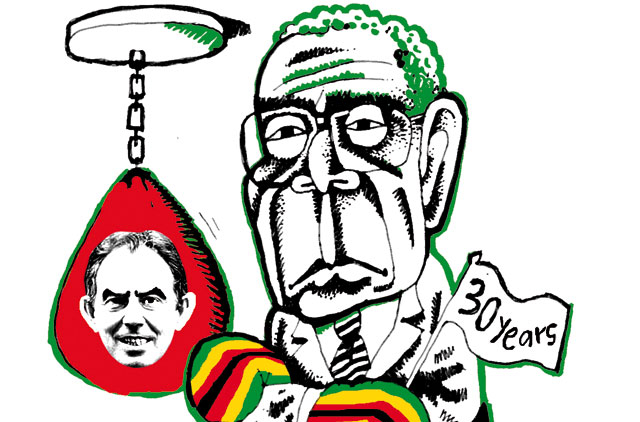Zimbabwe celebrates 30 years of independence Sunday. The unity government, led by President Robert Mugabe of Zanu PF and Prime Minister Morgan Tsvangirai of the MDC, has failed to rescue the country out of the economic abyss.
What happened to this nation once called the ‘Jewel of Africa', and who is to blame? Though it is difficult to offer a definitive answer, many will point to Mugabe as the major culprit.
In charge since 1980, Mugabe has presided over an economic decline that has left Zimbabwe a pale shadow of what it once was. Many now feel his plan to run for yet another term in 2013 will be the final nail in the coffin for the country.
The coalition has been anything but united. Pulling in different directions, it seems that it's just a matter of time before all parties in the arrangement call it quits and head their own separate ways.
But, just like Mugabe, the West has not been fair in its dealings with Zimbabwe. Having given indications that a unity government is all it takes to get Zimbabwe back on track, it was assumed that the targeted sanctions on Mugabe and his cronies would be lifted as a sign of goodwill. Boy, were we wrong.
Instead, Mugabe and Tsvangirai haggle over the issue of sanctions daily, with the 86-year-old leader digging his heels and refusing to give any major concessions until Tsvangirai convinces the West to drop sanctions against him and his allies.
The world has failed to realise that it is dealing with someone who has been under sanctions for almost 10 years now but who has gotten around them. Unfortunately, the same cannot be said of the poor people in Zimbabwe who are in need of basic services, food and jobs just to survive.
So what has the West learnt from this? From the looks of things — nothing, as it has just continued to extend sanctions until such a time it is convinced that Zanu PF and Mugabe are upholding democratic principles.
All the unity government has truly achieved has been stabilising the economy, bring downing runaway inflation that stood at an official 231 million per cent. Unemployment still stands at above 80 per cent, clean water is hard to come by and falling sick is a luxury one just can't afford!
There is a saying that when two elephants fight, it is the grass which suffers. The two elephants responsible for the chaos in Zimbabwe are Mugabe and Tony Blair, the former British premier whose poor judgment transformed a man with a bad human rights record into a dictator.
It was Blair who came to power in 1997 and annulled a pledge Britain had made to fund Zimbabwe's land reform, in exchange for Mugabe not grabbing land in white hands at Independence for at least 10 years. Blair's lieutenant Clare Short said, rather unashamedly, that: "We are a new government from diverse backgrounds, without links to former colonial interests." What nerve!
Such shocking deviation from international norm, where administrations honour the obligations of their predecessors, angered a desperate Mugabe, who was fast becoming unpopular after 17 years in power.
Independence war
The war for independence was largely about political rights and taking back land seized in 1930 under the Land Apportionment Act, which saw the majority of black Zimbabweans forcibly moved onto barren land called tribal trust lands while white settlers grabbed 85 per cent of all arable land.
Liberation fighters, who had been told that the land they fought for would only be available 10 years after independence, started challenging Mugabe's authority and embarrassing him in public. Blair failed to realise that Mugabe was sitting on a time bomb and would do anything to save his skin.
Mugabe gave in to their demands in return for their support.
In November 1997, he awarded over 50,000 war veterans gratuities equivalent to $4,000 (Dh14,680) and set them on the white commercial farmers. They took back the land with impunity, killing those who resisted.
Britain struck back with sanctions, which stick even today, and this was followed by sanctions from across the western world. The rest is history. The land issue is the reason why Zimbabweans, still with bitter memories of white minority rule, vote for Mugabe.
So what next? The onus lies with Britain to convince the world to give peace a chance in Zimbabwe. Once Britain leads, the world is likely to follow.
Sanctions have not hurt Mugabe or his allies, apart from helping in getting their children expelled from international universities across the world.
Mugabe has already played his part, he made overtures to British Prime Minister Gordon Brown and US President Barack Obama and was twice snubbed. He pledged to work with Tsvangirai and the sanctions stuck. He is 86 and chances are he will pass on in office, if the current situation continues.
Zimbabwe needs to get back on its feet. We can only do this if the West stops threatening their own companies eager to trade with Zimbabwean firms, if Britain swallows its pride and invites Mugabe back into the international fold, at the same time removing sanctions.
Maybe then they will give the old man the closure he seeks. Maybe then he will consider retiring and restore hope to Zimbabwe.
The current stalemate has to end and the West has to show goodwill.










